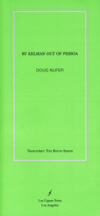By Kelman Out of Pessoa
Doug Nufer makes me wish I knew more about horse racing because if I was more knowledgeable about horse races and the art of betting on this sport, I’d get so much more from By Kelman Out of Pessoa. As book 4 of 5 in the TrenchArt Recon Series, Nufer’s novel swings a wide arc of gambled characters and the throw of the die, using a backdrop of gaming as the setting of the novel as well as a means to writing it, a sleight of hand best described by the editors of Les Figues Press:
Doug Nufer makes me wish I knew more about horse racing because if I was more knowledgeable about horse races and the art of betting on this sport, I’d get so much more from By Kelman Out of Pessoa. As book 4 of 5 in the TrenchArt Recon Series, Nufer’s novel swings a wide arc of gambled characters and the throw of the die, using a backdrop of gaming as the setting of the novel as well as a means to writing it, a sleight of hand best described by the editors of Les Figues Press:
Nufer went to Emerald Downs, home of thoroughbred racing in the Northwest. There, he split himself into three characters modeled on the heteronyms of Fernando Pessoa. Using a money management plan from a James Kelman short story, Nufer gave these characters money and set them free to gamble. He returned to the track every week for a full season, and his characters/heteronyms continued to bet, with real money and in the name of art. At the end of the season, he had pages of data in the form of a wagering diary, the outcome of a literary experiment that formed the basis of a literal experimental novel.
As a moment of recon, gathering data and spilling it onto the page in words and plot-lines and images, By Kelman Out of Pessoa succeeds. The narrative shifts are unpredictable thanks to their grounding in gamed risk, and the language is its own amalgam of plot-driven characterization and constant word-play, always switching and reversing and reiterating itself in the form of manipulated sentences:
The one reflected the other, the other reflected the one. The face in the mirror was the mirror in the face.
If each of us might spawn a mob, then us of each might mob a spawn. Didn’t it stand to reason that one play the devil’s advocate? It reasoned to stand that one advocate the devil’s play.
His mind would work as his work would mind: backwards.
Les Figues Press nails the design and production elements though, and the introduction and preface to the novel elevate the idea of the book before we’ve even begun reading it. But, without a more than generic knowledge of horse racing and the companion task of betting on races, it is tough for a reader to fully invest in Nufer’s story. So much hinges on the idea of gambling and the way in which stakes raise and re-raise and combine and decline, that following By Kelman Out of Pessoa is no easy task. And Doug Nufer really does have a vibrant hand on the page, I just wish that I’d lived in those gambler shoes for a few years before reading By Kelman Out of Pessoa, as I think it would allow me to love this book a bit more.





